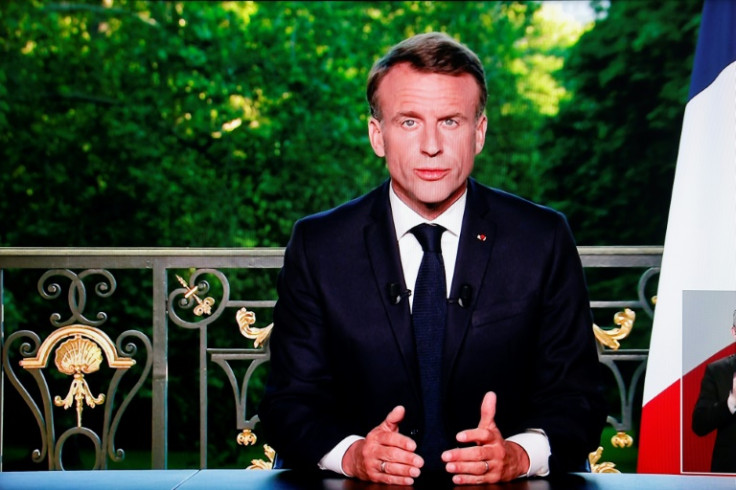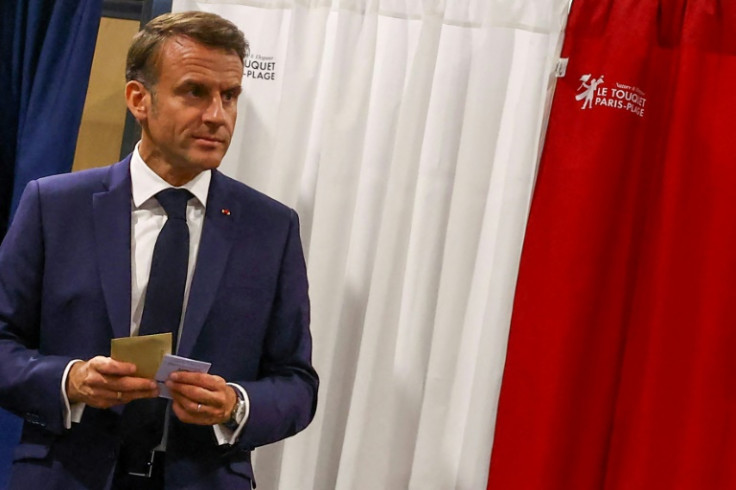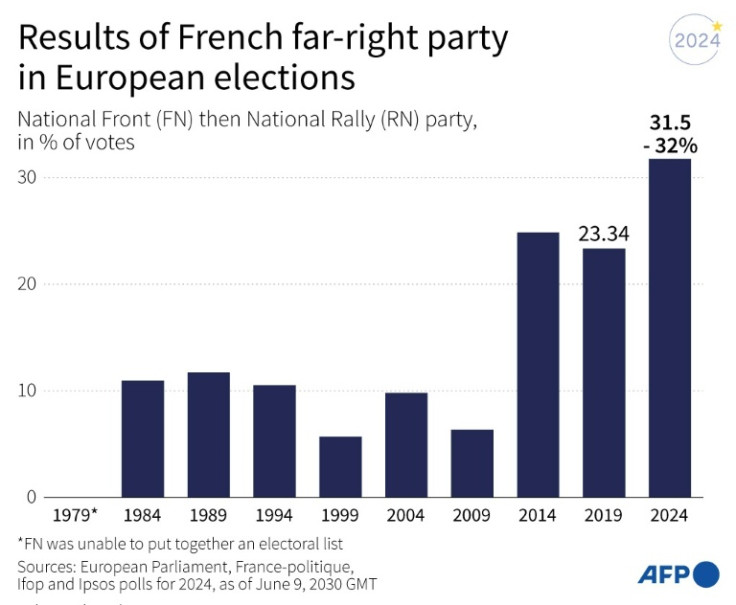Macron Gambles On Snap Elections To Halt Far-right March

French President Emmanuel Macron has taken the biggest gamble of his political career by calling early legislative elections to combat the surge of the far right, with the outcome decisive for his political legacy.
France will go to the polls to vote for a new National Assembly on June 30, with a second round on July 7, Macron said in an address to the nation.
His stunning announcement came after EU election projections showed the far-right National Rally (RN) had scored more than double the votes of his centrist alliance in the French vote.
"The extreme gamble," wrote daily Liberation in the front-page headline of its Monday edition.
In his address to the nation, Macron noted that in total far-right parties in France had won almost 40 percent of the vote.
"It is a situation to which I cannot resign myself... I cannot act as if nothing had happened," Macron added.
The presidential camp now just has three weeks to make up ground on the RN in a short but intense burst of campaigning before France hosts the Paris Olympics in July and August.
With turnout in the European elections projected in France at just over 52 percent, Macron's allies will be hoping to attract voters who stayed at home to block the far right.
In a best-case scenario for Macron, his centrist alliance would recover the absolute majority it lost in 2022 legislative elections and give new impetus to the remaining three years of his presidential mandate.
The nightmare outcome for him would be the RN winning a majority. That would likely see its leader Jordan Bardella, a protege of three-time presidential candidate Marine Le Pen, become prime minister in an uncomfortable "cohabitation".
A middle scenario, analysts say, would be an anti-extremism coalition between Macron's centrists and the traditional right-wing Republicans or even left-wing Socialists.
Celine Bracq, director general of the Odoxa polling agency, described Macron's announcement as a "poker move" at a time when there is a "strong desire on the part of the French to punish the president".
"It's something extremely risky," she told AFP. "In all likelihood, the National Rally, in the wake of the European elections, could have a majority in the National Assembly and why not an absolute majority."
Luc Rouban, political scientist at Sciences Po in Paris, said Macron wanted to "trap" the RN with his sudden election announcement, arguing the party would find trouble mustering quality candidates to challenge for the 577 seats in the National Assembly.
"I think Macron's idea is to play on something with the right," he added.
Speaking to AFP, ruling Renaissance party chief and Foreign Minister Stephane Sejourne gave an indication of how the campaign could play out.
He said the party would not challenge outgoing MPs from the traditional left and right for their seats if they were prepared to "invest in a clear project" around the presidential majority.
Leaders of left-wing parties called on their camp to unite to face the RN challenge.
While the balance of power "has evolved", Socialist party leader Olivier Faure called for "a gathering which allows us to have a project, which allows us to be heard by the French", and Communist Party leader Fabien Roussel said the left should "work together on a pact for France".
Across the political spectrum, Eric Zemmour, of the far-right Reconquete, called for "the broadest union of the right".
Marion Marechal, who headed the party's list in the EU elections, said she was "ready to meet in the coming days" with Le Pen, who is her aunt, Bardella and Republicans leader Eric Ciotti.
Mujtaba Rahman, managing director for Europe at Eurasia Group, said Macron had taken "a major gamble".
"This is really him trying to seize the initiative," he told AFP.
"There is a serious risk of cohabitation", he added, referring to a situation in which a president and prime minister from opposing political parties have to find a way to run the country together.
"The most likely outcome is more fragmentation, more deadlock and chaos. A complete paralysis."
The tumult comes at a critical moment.
Attention is turning to France's 2027 presidential vote, where Macron cannot stand again and RN figurehead Le Pen fancies she has her best-ever chance of winning the Elysee Palace.
"We are ready to exercise power if the French people have confidence in us," said Le Pen.
Le Pen taking the Elysee would wreck the political legacy of Macron, who sees himself as a bulwark against the far right on a European scale.
The dissolution is the first such move since 1997, when right-wing president Jacques Chirac called snap legislative elections only to see the left win a majority.
A presidential adviser, who asked not to be named, said that Macron's camp was going into the elections "to win".
"Risk-taking" is part of the "DNA" of Macron's camp, the adviser added.
"Dissolving parliament without giving anyone time to organise and without a campaign is to play Russian roulette with the destiny of the country," she wrote on social media platform X.




© Copyright AFP 2025. All rights reserved.




















